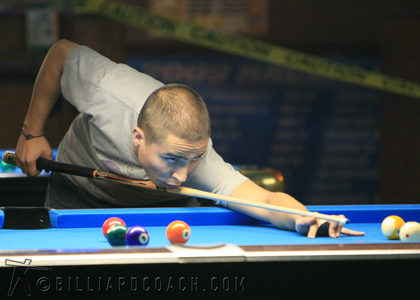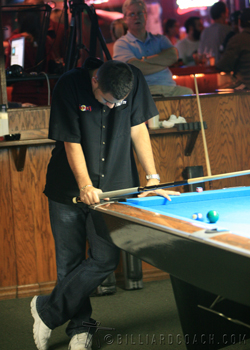Strategy:Â Should your opponent dictate your strategy?
Mike Fieldhammer – November 2009
This article is the first of a series of posts written in coordination with other pool bloggers. This first month’s theme is STRATEGY. To see others, go to: http://www.poolstudent.com/2009/11/15/poolsynergy-volume-001/
Most pool players have heard the phrase “Play the table not the player.† I believe this phrase originated to encourage players to stay calm if they are playing a champion and to never to let up if they’re playing a beginner. The cliché seems to have morphed into an idea that a player should forget about his opponent and execute the one truly correct shot at the table. This is generally good advice and helps many players focus on the task at hand—play the best shot available for the given table layout. There are exceptions to this rule when you may want to adapt your strategy depending on your opponent. Knowledge of your opponent’s abilities, style, or strategy could alter your shot selection.

The game of one-pocket is the most obvious scenario in which to prove that you must consider your opponent. Familiarity with your foe’s skill set greatly aids shot selection. Is your one-pocket opponent a ball runner, one who can’t run more than three or four balls, a banking expert, a wonderful mover weak on long straight shots, prone to take crazy low percentage shots, or one who never takes a gamble on a shot? The answers to these questions should factor into your choice of shots. And sometimes faced with a do or die shot vs. a safety situation, you may need to ask yourself, “Will I get a better opportunity in the game against this opponent?â€
This type of shot analysis could also apply to the more popular game of 8-Ball. Some of these strategies are outlined based on your ability and skills compared to your opponents. Familiarize yourself with your opponent’s strengths and weaknesses by watching matches of upcoming opponents. Take mental or written notes on their styles, weapons, and weaknesses. Do they own a jump cue and use it extremely well? How accurately do they kick? Do they play aggressively with no safes or are they patient and cautious? This scouting information can be useful in deciding whether to attempt a run out or play some sort of safety. In fact, it can narrow down the type of safety that will give you the best chance to win.
While playing better players, remember that their breaks are a big advantage for them. They will break and run more often and control the table better. You must take advantage of every single chance that you get at the table. Run out if you are able and play a lock-up safety (jail) versus the toughest opponents. They will make you pay for a missed shot and they will kick/jump out of so-so safeties.
Weaker opponents may not open up the rack as well on the break and you might have to be more patient for a chance to run out. The penalty for a missed shot might not lead to a loss of game; you could get another chance. It could be that a mediocre safe is good enough versus a poor to average player. Count on more ball-in-hands after safeties.

When playing weaker opponents, you may want to count on getting another chance at the table or leave trouble areas untouched. You may find that they can’t pick through congested racks but run through wide open racks at will. Consider a second-ball break or a more difficult layout rather than blasting them wide open. A tougher opponent will open up the clusters correctly while you may be doing a lesser opponent a favor if you break open the cluster and allow them back to the table. Lay down a safety and then break up the trouble with ball in hand. Table safes (distance with no good shot) are more effective versus beginner players. Advanced or expert players will fire back if they can see it with a better safe or might bank it in. If your opponent is vastly superior at safety play, go for the tough game breaker shot if you can win versus engaging in a tactical safety battle. You might get out-moved otherwise.
Sometimes your strategy may evolve within the flow of the match. If your opponent has been sitting and is cold, you may want to choose a safety rather than trying a tough shot. Make them earn the game and prevent them from getting warmed up with a wide open shot to get them started. Knowing your opponent can also shape your mental strategy. Always try to amass a lead in a match and know that players of all abilities might fall apart or may claw back. Prepare, nay, assume that’s the case so you’re game isn’t thrown off if you begin to see your player have a meltdown or stage a monumental comeback. Regardless, try to put the player away as soon as possible. Also, be prepared for your opponent’s pace of play so that you aren’t thrown off your rhythm. Hopefully, you’ve developed your own tempo or pace and you shouldn’t feel pressured or deviate from your optimum speed of play.
“Play the table, not your opponent?†Sure, the table and your skills will dictate your course of action most of the time, but a slight change in decision-making based on who your opponent is might give you a slight edge.
Leave a Reply